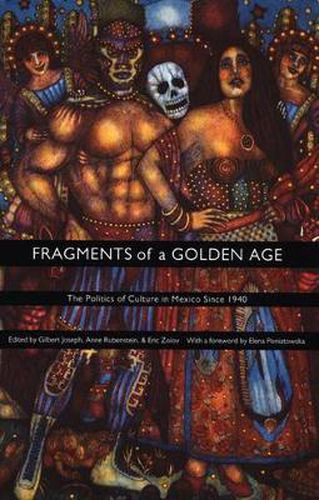Readings Newsletter
Become a Readings Member to make your shopping experience even easier.
Sign in or sign up for free!
You’re not far away from qualifying for FREE standard shipping within Australia
You’ve qualified for FREE standard shipping within Australia
The cart is loading…






During the 20th century the Mexican government invested in the creation and promotion of a national culture more aggressively than any other state in the western hemisphere. Fragments of a Golden Age provides a comprehensive cultural history of the vibrant, post-1940 Mexico that emerged. Agreeing that the politics of culture and its production, dissemination, and reception constitute one of the keys to understanding this period of Mexican history, the volume’s contributors - historians, popular writers, anthropologists, graphic artists, and cultural critics - weigh in on a wealth of topics from music, tourism, television, and sports to theatre, unions, art, and magazines. Each essay in its own way addresses the fragmentation of a cultural consensus that prevailed during the golden age of post-revolutionary prosperity, a time when the state was still successfully bolstering its power with narratives of modernization and shared community. Combining detailed case studies - both urban and rural - with larger discussions of political, economic, and cultural phenomena, the contributors take on such topics as the golden age of Mexican cinema, the death of Pedro Infante as a political spectacle, the 1951 caravan of hunger, wrestling, rock music, and soap operas. Fragments of a Golden Age should fill a particular gap for students of modern Mexico, Latin American studies, cultural studies, political economy, and 20th twentieth century history, as well as to others concerned with rethinking the cultural dimensions of nationalism, imperialism, and modernization.
$9.00 standard shipping within Australia
FREE standard shipping within Australia for orders over $100.00
Express & International shipping calculated at checkout
During the 20th century the Mexican government invested in the creation and promotion of a national culture more aggressively than any other state in the western hemisphere. Fragments of a Golden Age provides a comprehensive cultural history of the vibrant, post-1940 Mexico that emerged. Agreeing that the politics of culture and its production, dissemination, and reception constitute one of the keys to understanding this period of Mexican history, the volume’s contributors - historians, popular writers, anthropologists, graphic artists, and cultural critics - weigh in on a wealth of topics from music, tourism, television, and sports to theatre, unions, art, and magazines. Each essay in its own way addresses the fragmentation of a cultural consensus that prevailed during the golden age of post-revolutionary prosperity, a time when the state was still successfully bolstering its power with narratives of modernization and shared community. Combining detailed case studies - both urban and rural - with larger discussions of political, economic, and cultural phenomena, the contributors take on such topics as the golden age of Mexican cinema, the death of Pedro Infante as a political spectacle, the 1951 caravan of hunger, wrestling, rock music, and soap operas. Fragments of a Golden Age should fill a particular gap for students of modern Mexico, Latin American studies, cultural studies, political economy, and 20th twentieth century history, as well as to others concerned with rethinking the cultural dimensions of nationalism, imperialism, and modernization.